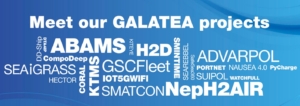ENMC meeting with DG MARE representatives
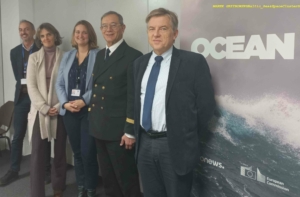
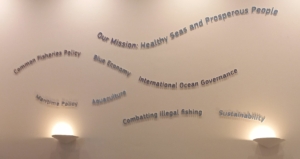
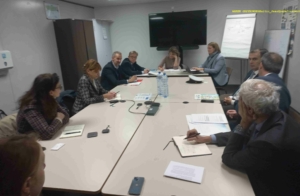
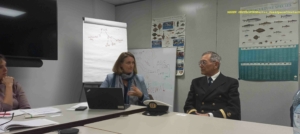
The ENMC meeting with representatives of DG MARE took place on 17 November this year. Members of the European Network of Maritime Clusters have met with representatives of DG MARE. At the DG MARE headquarters, the meeting was attended by: Lorella de la Cruz, Deputy Head of Unit, MARE A2 (Blue Economy Sectors, Aquaculture and Maritime Spatial Planning), Pauline Caumont, Policy Assistant, MARE A2, Manuel Pleguezuelo Alonso, Policy Officer, MARE A3 (Sea basin strategies, Maritime Regional Cooperation and Maritime Security), PhD. Marcin Sadowski, Policy Officer, MARE A1 (Maritime Innovation, Marine Knowledge and Investment).
The Commission’s Directorate-General for Maritime Affairs and Fisheries is responsible for the policy area of fisheries, the Law of the Sea and Maritime Affairs. DG MARE works to:ensure that the ocean resources are used sustainably and that coastal communities and the fishing sector have a prosperous future, promote maritime policies and stimulate a sustainable blue economy, promote ocean governance at international level – informed Lorella de la Cruz, Deputy Head of Unit, MARE A2.
An important activity is the creation of activities aimed at eliminating pollution, a program to remove plastic from the oceans, spatial planning, and sustainable development in the use of marine and seafood resources. The EU will fight marine litter through a new strategy on plastics in 2017 and through an update of the rules governing waste disposal for vessels. It will also seek global partnerships to identify and implement effective strategies against both plastic litter and micro-plastics. Originally part of the common agricultural policy (CAP), the common fisheries policy (CFP) started with the same objectives: to increase productivity, to stabilise the markets, to provide a source of healthy food and, to ensure reasonable prices for consumers.
The mission of DG MARE is “To steer, in close relationship with stakeholders at regional and European level, the development and implementation of the Integrated Maritime Policy and to manage the Common Fisheries Policy with a view to promote the sustainable development of maritime activities as well as the sustainable exploitation of fisheries resources within and beyond Community waters” – informed Manuel Pleguezuelo Alonso, Policy Officer, MARE A3.
For the first time, the EU and neighbouring countries in the Mediterranean agreed on the establishment of five fully-fledged multiannual management plans (MAPs) based on the principles of the Common Fisheries Policy (CFP) in November 11th. It is a key step in improving the environmental and economic sustainability of fishing in the Mediterranean. It is the outcome of the 45th annual meeting of the General Fisheries Commission for the Mediterranean (GFCM). Thanks to the joint efforts of the Commission, Member States and more than 20 other coastal countries, the GFCM unanimously adopted a total of 21 ambitious measures, 19 tabled by the European Union, for the management and control of fisheries, aquaculture and the protection of sensitive habitats. The EU is also supporting the implementation of all the measures and the new GFCM 2030 Strategy with an annual grant of €8 million.
Actions for the implementation of innovations in maritime areas, the use of innovations in the development of sustainable ocean resources and the protection of the marine environment and coasts are very important – said Marcin Sadowski, Policy Officer, MARE A1.
The EU will build on the success of its ‘Blue Data Network’ – a collaboration of over 100 research institutions – and further develop international scientific partnerships to obtain a worldwide marine data network open to all. Better knowledge of the sea will mean more sustainable actions. The EU, NATO and partner countries will work together to protect against maritime threats such as piracy and human trafficking. It will work to reduce maritime accidents and prevent environmental disasters.
Baltic Sea & Space Pentagon Helix Cluster
After a short period of incubation and activities in the Triple Helix formula, the cluster through participation in international projects transformed into an organization operating in the Qudralupe Helix system.
Today the cluster develops in the Pentagon Helix formula, integrating the transfer of knowledge between science and business, supporting social initiatives, local government and administration, developing investor relations – says Marek Grzybowski, President BSSC and explains that today the cluster’s activity is characterized by a holistic, integrative and global approach, making the activity of maritime industries part of Economy 4.0. – We owe our position also to the close cooperation with the Space Science Commission of the Gdańsk Branch of the Polish Academy of Sciences. 4 conferences on space and maritime technologies, maritime and space law, economics and social sciences are organized jointly every year.
![]()
Within the „Cluster” there are currently six Hubs: ICT & AI, construction of zero-emission ships – ZEVInnovation, design and construction of installations producing green energy – GreenTech, scientific-research, legal-financial and educational. All hubs bring together around 60 companies, research centers and R&D units.


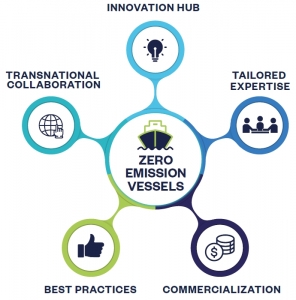

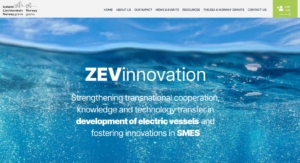
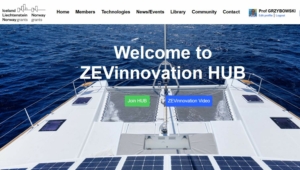
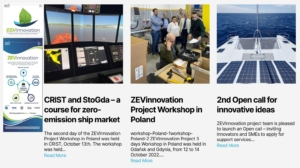
BALTIC ZEV Innovation HUB can produce zero-emission service ships for servicing wind farms and installation platforms for the construction of offshore wind farms. CRIST shipyard is the coordinator of the hub. Crist Shipyard offers innovative ships to its foreign contractors. There are often unique products. We have been building vessels, platforms and offshore constructions
BALTIC ZEV Innovation HUB operates as part of a project implemented with Norwegian funds ZEVInnovation HUB. , together with partners from Norway and Croatia, is developing cooperation to position zero-emission ships on European Union markets. ZEVinnovation is a transnational cooperation platform that supports development of innovative zero-emission vessels and related technologies. ZEVinnovation is commited to advancing transnational collaboration and bringing together a professional community interested in zero-emission technologies and preservation of our environment.
ZEVInnovation HUB has professional and experienced members from around the EEA. Connect with experts in your business activity area and secure your innovation potential with mentorship and guidance. ZEVInnovation HUB invites to demonstrate specific zero-emission technologies and dominate on the global market, and to learn through knowledge-sharing, innovation and internationalization of business in the EEA, and to explore and apply usable tools that tackle SME needs during the process of innovation and commercialization and strengthen your capitalization and sustainability potential.
Smart Port, Smart Shipyard, Smart Ship, Maritime Surveillance
The Baltic Sea and Space Cluster (BSSC) participates in the innovation project development in the smart port, smart ship, smart shipyard and maritime surveillance fields. BSSC was invited to the project by Pôle Mer Méditerranée and Aerospace Valley from France. They appreciated the strong brand of the Cluster on the market of the Baltic Region and Central Europe. The activity of the Cluster members on international markets and in regional projects, participation in the development of innovation, knowledge transfer and commercialization of research, gained special recognition from the partners of the GALATEA project.
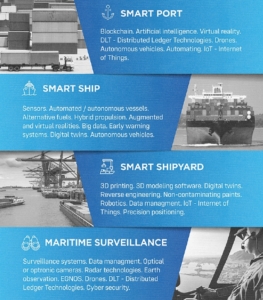
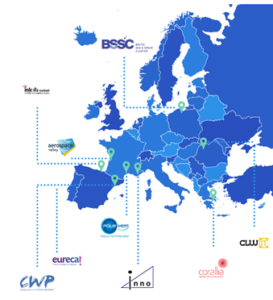
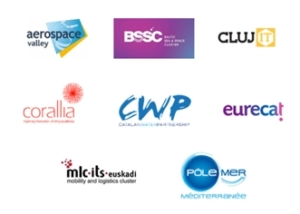

GALATEA is a continuation of the „NEPTUNE, INNOSUP-1, Blue Growth Accelerator” project. Both projects are financed from the Horizon 2020 program. Neptune initiated the first major wave of innovation in the European Union’s “blue economy”. It has achieved significant results in supporting small and medium-sized enterprises (SMEs) producing innovative products and services. Neptune accelerated the process of successfully implementing innovation in EU maritime industries.
During the project, cooperation in cross-border arrangements was developed and new value chains were created. Small and medium-sized EU companies related to the maritime economy, thanks to the funds obtained from Horizon 2020, could exist on a transnational scale. Importantly, small businesses were supported in introducing innovative products and services to the international market.
GALATEA will receive 3.67 million euro from the European Commission’s Horizon 2020 program. 79% of this will be dedicated to direct financial support for SMEs, as well as services provided by GALATEA partners and other organized activities. Around 100 European SMEs are expected to receive support. Finance will be spent on the development of innovative products, services or processes, the development of interdisciplinary projects on a large scale or impact of innovation positioning on international markets.
Therefore, an important feature of the project is the integration of activities of strong partners from 3 sea basins: the Atlantic, the Baltic and the Mediterranean Sea, emphasize the authors of the project. The leader is the strong French Maritime Cluster Pôle Mer Méditerranée – Toulon Var Technologies. The GALATEA project will support the development of technological and process innovations in the following areas (https://twitter.com/galatea_project): seaports (Smart & Green Ports), ships (Smart & Green Ships), shipbuilding and ship repairing business (Smart & Green Shipyard) and control and monitoring of sea areas (maritime surveillance).
